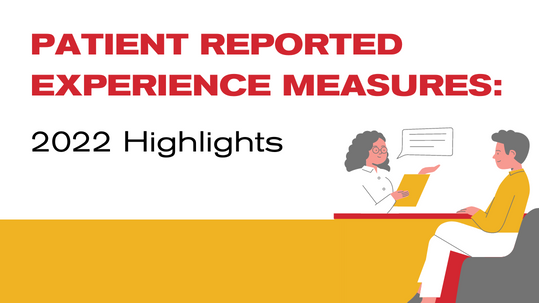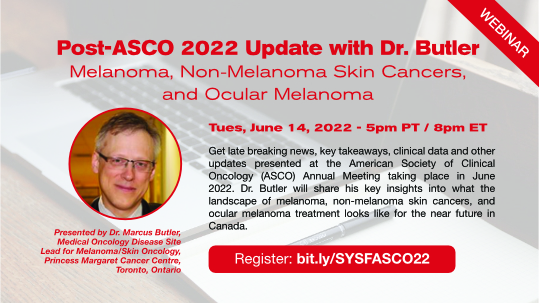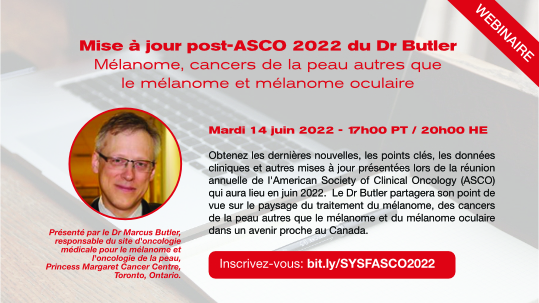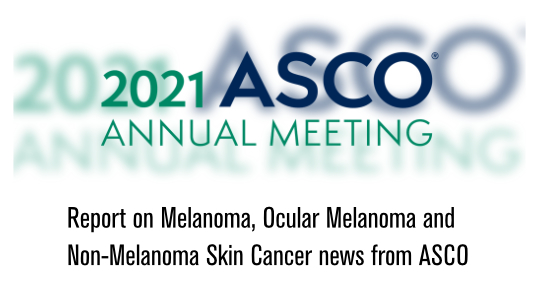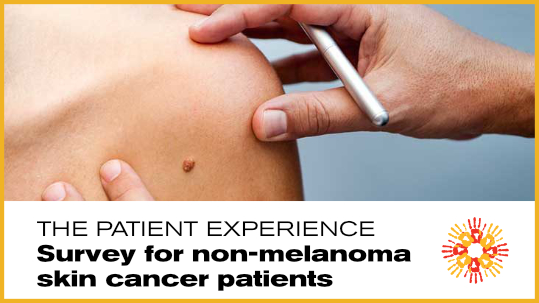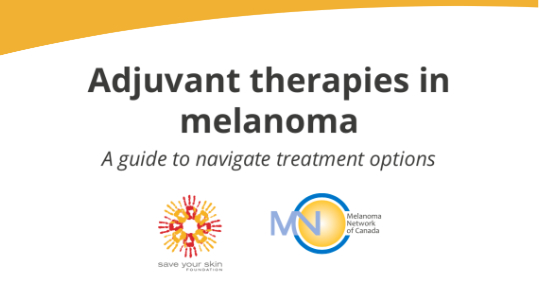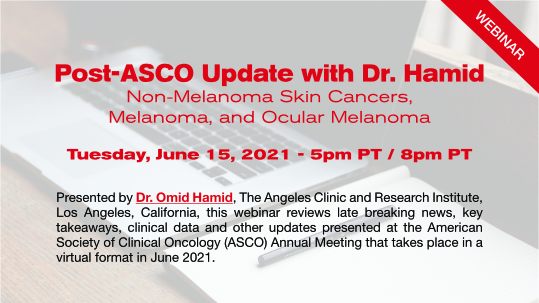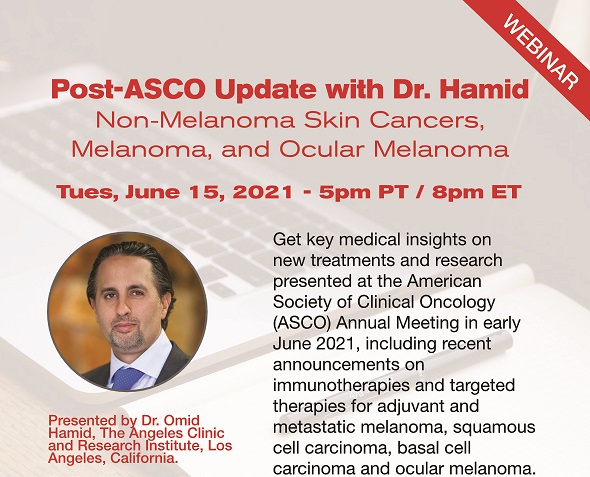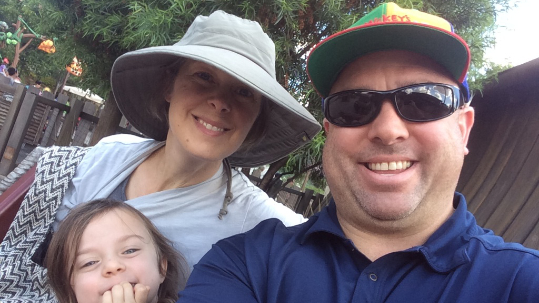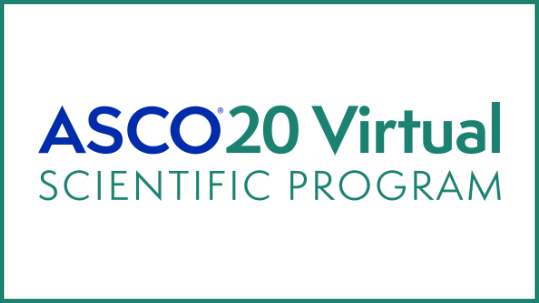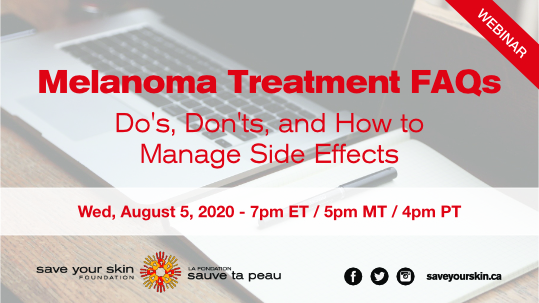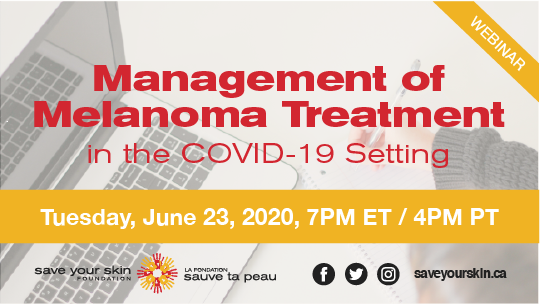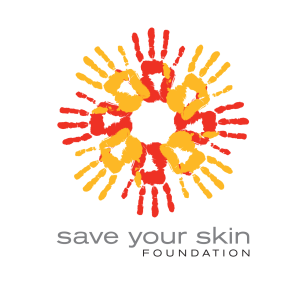In 2022, Save Your Skin Foundation ran three major patient surveys in order to collect patient-reported experience measure data (PREMs):
- “The Patient Experience: Systemic Treatment of Adult Cutaneous Melanoma” (April/May)
- “The Patient Experience: Treatment of Patients with Ocular Melanoma” (April/May)
- “Patient Survey: Treatment Plan Decision-Making” (September/October)
Long-form reporting of the data for “The Patient Experience: Treatment of Patients with Ocular Melanoma” and “Patient Survey: Treatment Plan Decision-Making” are available on the Save Your Skin website. “Treatment Plan Decision-Making” was available in both English and French, and was developed in partnership with AIM at Melanoma. The following blog highlights some particularly notable outcomes from these surveys; we hope you find something of interest to you!
Highlights from “The Patient Experience: Systemic Treatment of Adult Cutaneous Melanoma”
- When asked if they would consider it reasonable to receive additional treatments should their melanoma recur at a later stage, 78.26% directly indicated that they would be interested in additional treatments (Q12).
- When asked specifically about their experiences on Pembrolizumab (Keytruda™), 73.68% reported enduring fatigue as a side effect, followed in frequency of votes by skin rashes (36.84%) and cognitive impairment (26.32%) (Q17). 61.11% found these side effects manageable (Q18).
- 95.45% of participants indicated that the side effects resulting from this therapy were worth it for the benefits of the treatment (Q19).
- When asked if they would consider receiving drug therapy from a clinical trial, 77.27% responded that they would, should the need arise. Of the 22.73% that responded “not sure,” several added comments indicating that they would consider it, but would need more information (Q22).
Highlights from “The Patient Experience: Treatment of Patients with Ocular Melanoma”
- 63.63% of our ocular melanoma survey participant pool who have not received genetic testing would like to, suggesting that many patients see this as a worthwhile process (Question 11).
- Unsurprisingly, eye-related side effects are the most common for patients with ocular melanoma. These include loss of vision (64.51% of responses), eye pain (16.12%), cataracts (9.67%), flashes of light in the eyes (12.9%), dry eyes (3.22%), macular edema (3.22%), and retinopathy (3.22%) (Q16).
- 82.35% of participants have ongoing follow up appointments/testing every 3-6 months (Q20).
- 79.31% of responses suggested that if their disease were to progress in the future, they would be interested in receiving additional treatments (Q21).
- 64.71% of survey participants indicated that if they were offered enrolment in a clinical trial, they would take it (Q24).
- The most frequently cited side effects by participants receiving KIMMTRAK ® (tebentafusp-tebn) for their ocular melanoma were fatigue and skin rashes (both selected by 50% of participants) (Q28).
- 100% of patients who received KIMMTRAK ® (tebentafusp-tebn) noted that the side effects of this treatment were worth enduring for the survival benefit (Q30)
- The most frequently cited barrier to accessing KIMMTRAK ® (tebentafusp-tebn) was having to travel to another city, which was both an inconvenience and a financial hardship (Q31).
Highlights from “Patient Survey: Treatment Plan Decision-Making” English language survey
- When asked what was the most important topic to discuss with their healthcare team at the time of diagnosis out of the following options: “care plan,” “prognosis,” “treatment timeline,” “quality of life,” and “financial considerations,” survey participants selected “prognosis” as their primary concern, followed by “treatment timeline” and then “care plan.” That “quality of life” and “financial considerations” are the lowest priorities suggests that patients care about survival above all else (Q7).
- Questions nine and ten demonstrated that patients are creating a treatment plan with their healthcare team along their ideal timeline, which is either at the time of diagnosis or between their first and third appointments.
- The majority of survey participants (76.56%) stated that they understood at least “most” of the cancer-related information provided to them (Q12); however, 32.82% expressed dissatisfaction with the amount and quality of the information they received (Q21).
- When asked what resource they most frequently turn to for cancer-related information (other than their healthcare team), the internet was cited by 82.54% of participants (Q13)
- Questions 15 and 16 illustrated that 73.44% of participants feel they had an appropriate amount of input in developing their treatment plan.
- When asked to prioritise the following factors when developing a care plan: “dosing schedule/logistics,” “long-term survival,” “risk of adverse events/side effects,” “financial concerns,” and “lifestyle and family implications,” patients ranked “long-term survival” as their highest priority (Q17).
- When asked to indicate the two most significant challenges they experienced during treatment, the need for emotional support (60.94%) and the impact of physiological symptoms (45.31%) had the highest number of votes (Q27).
Highlights from “Patient Survey: Treatment Plan Decision-Making” French language survey
- When asked what was the most important topic to discuss with their healthcare team at the time of diagnosis out of the following options: “care plan,” “prognosis,” “treatment timeline,” “quality of life,” and “financial considerations,” survey participants selected “care plan” as their primary concern, followed by “prognosis” and then “quality of life” (Q7).
- Like the English language cohort, the French language survey participants received care plans along their ideal timeline of either at the time of diagnosis or between the first and third appointments (Q9, 10).
- In the French language survey, a greater percentage of participants indicated having more responsibility for the development of their care plans. Only 27.27% felt “appropriately involved,” while 63.63% indicated that they made the decision more independently (Q15).
- When asked to prioritise the following factors when developing a care plan: “dosing schedule/logistics,” “long-term survival,” “risk of adverse events/side effects,” “financial concerns,” and “lifestyle and family implications,” the French language patients also ranked “long-term survival” as their highest priority (Q17).
- When asked whether they felt prepared for treatment, participants had polarised responses; 63.64% reported feeling “entirely prepared for treatment,” while 27.27% were “mostly unprepared for treatment” (Q24).
- When asked to indicate the two most significant challenges they experienced during treatment, the French language survey participants voted most frequently for physiological symptoms (54.55%), followed by emotional support and a lack of information, which were tied for votes (36.36% each). This suggests that the need for emotional support is more satisfied for the French language survey participants (Q27).
The data from patient reported experience measures, sampled above, is instrumental to our operations as a patient group. We consider these reports when we are prioritizing our initiatives for the new year, preparing our strategic plans for patient support, education, awareness, health policy, and advocacy, and share them with other stakeholders in the cancer space. We hope this information was valuable to you, and that the new year brings you joy, prosperity, and good health.


